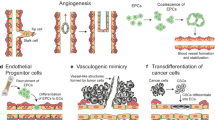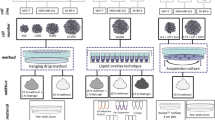Abstract
Mesotheliomas induced in rats by intrapleural injection of the fibrous zeolite, erionite, were serially transplanted in nude mice for up to ten generations. The cell phenotypes (epithelial or sarcomatous) were well maintained during passaging, as determined morphologically and by the expression of the cytokeratin markers demonstrated in normal mesothelial cells. Some of the tumours occasionally produced metastasis in nude mice. In contrast, a cloned epithelial cell mesothelioma and sarcomatous cell mesothelioma, the original cells of which were isolated in tissue culture, both produced regular multiple metastases when passaged in nude mice. These metastases were frequently found on the visceral pleura, rather than in the lung parenchyma, in nude mice. The high metastatic rate of the xenograph mesotheliomas derived by in vitro isolation of cells from mesotheliomas is atypical of the usual behaviour of xenografts of mesotheliomas.
Similar content being viewed by others
Author information
Authors and Affiliations
Rights and permissions
About this article
Cite this article
Edwards, R., Hill, R., Brown, D. et al. Phenotypic stability and metastatic behaviour of serially xenografted rat mesotheliomas. Br J Cancer 62, 201–204 (1990). https://doi.org/10.1038/bjc.1990.260
Issue Date:
DOI: https://doi.org/10.1038/bjc.1990.260
- Springer Nature Limited




